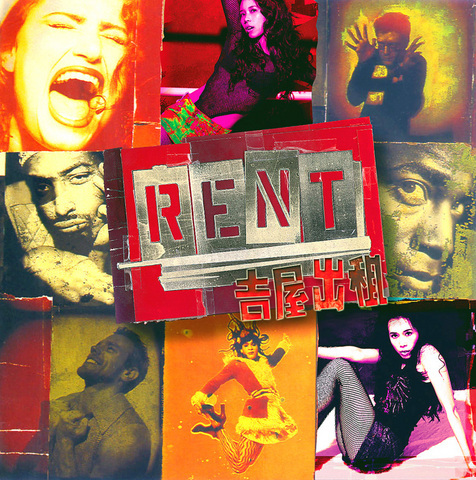The 10 year-old musical Rent has gained a new lease on life and is now touring Asia. It will tack up a sign and take to the stage of the International Convention Center on Feb. 7 through Feb. 12.
Based on Giacomo Puccini's 1896 opera, La Boheme, Rent tells of one year in the life a group of friends living a Bohemian life in New York's East Village in 1990, struggling to succeed as artists, haunted by the specter of HIV, ravaged and rewarded by their relationships, and of course trying hard to pay the rent.
"Five hundred twenty-five thousand six hundred minutes," are Rent's opening lines. "How do you measure, measure a year? In daylights, in sunsets, in midnights in cups of coffee. In inches, in miles in laughter in strife. In five hundred twenty-five thousand six hundred minutes. How do you measure a year in the life?"

PHOTOS COURTESY OF BROKER BROTHERS
For the show's co-creator, Jonathan Larson, the answer was to "measure it in love ... seasons of love."
In 1989, he teamed up with playwright Billy Aronson and wrote the music and lyrics for the show. Originally set in New York's Upper West Side, Aronson moved the action to New York's downtown area, where Larson himself lived. From there, the story began to more closely reflect Larson's own life, where he and friends kept an apartment in a derelict building with only an illegal wood-burning stove -- and each other's company -- to keep warm.
Like the show's lead character, the filmmaker Mark, Larson had an on-again, off-again relationship with a dancer who ultimately left him for a woman. His own roommate became the inspiration for Mark's roommate, the HIV-positive musician and former junkie Roger. Larson's childhood friend became the inspiration for Angel, Rent's HIV-positive drag queen street musician.

Other characters that round out the script tell of the turmoil in the lives of a generation of artists confronted with HIV: Angel's boyfriend is a computer whiz who is also living with HIV. Roger's girlfriend, Mimi, is also an HIV-positive drug addict S&M dancer. And Taye is the group's former friend who married for money and became their landlord and the anti-thesis of everything they held dear.
For the Asian touring company, many of these roles will be played by members of the original Broadway cast, putting to rest the notion that Taiwan gets only third-rate production
companies.
The show's Broadway alumni Jeremy Kushnier, John Eric Parker, Trey Ellet, Danielle Lee Greaves, Andy Senor and Caren Lyn Manuel are all reprising their original roles.
But for local audiences, the biggest draw may well be Karen Mok (莫文蔚) playing the drug addicted S&M dancer Mimi. Reviews of the show's dates in Singapore, Hong Kong, Beijing and Shanghai have focused largely on Mok's performance, calling it everything from solid to outstanding, and getting better with each show date.
Mok had only two weeks' preperation time and four rehearsals with the cast before the Singapore premiere.
Like many of the characters in the heart-wrenching story, Larson's own life came to a tragic end. After struggling with the show through years of workshops and rewrites, Larson died of an aortic aneurysm the night before Rent's off-Broadway premiere. He was 35.
Following rave reviews, the show moved to the Nedelander Theater on Broadway. It opened 10 years ago this coming April and went on to earn four Tony awards, including Best Musical, Best Book of a Musical and Best Score of a Musical, as well as the New York Drama Critics' Circle Award for Best Musical. It also earned Larson a posthumous Pulitzer Prize for Drama.
For your information :
WHAT: Rent, starring the show's Broadway cast and Karen Mok
WHERE: The International Convention Center, in Taipei (
WHEN: From Feb. 7 to Feb. 12
TICKETS: Available now through the ERA Ticketing system, tickets cost between NT$1,000 and NT$6,000.
Call (02) 2341 9898 for details.

On April 26, The Lancet published a letter from two doctors at Taichung-based China Medical University Hospital (CMUH) warning that “Taiwan’s Health Care System is on the Brink of Collapse.” The authors said that “Years of policy inaction and mismanagement of resources have led to the National Health Insurance system operating under unsustainable conditions.” The pushback was immediate. Errors in the paper were quickly identified and publicized, to discredit the authors (the hospital apologized). CNA reported that CMUH said the letter described Taiwan in 2021 as having 62 nurses per 10,000 people, when the correct number was 78 nurses per 10,000

As we live longer, our risk of cognitive impairment is increasing. How can we delay the onset of symptoms? Do we have to give up every indulgence or can small changes make a difference? We asked neurologists for tips on how to keep our brains healthy for life. TAKE CARE OF YOUR HEALTH “All of the sensible things that apply to bodily health apply to brain health,” says Suzanne O’Sullivan, a consultant in neurology at the National Hospital for Neurology and Neurosurgery in London, and the author of The Age of Diagnosis. “When you’re 20, you can get away with absolute

May 5 to May 11 What started out as friction between Taiwanese students at Taichung First High School and a Japanese head cook escalated dramatically over the first two weeks of May 1927. It began on April 30 when the cook’s wife knew that lotus starch used in that night’s dinner had rat feces in it, but failed to inform staff until the meal was already prepared. The students believed that her silence was intentional, and filed a complaint. The school’s Japanese administrators sided with the cook’s family, dismissing the students as troublemakers and clamping down on their freedoms — with

As Donald Trump’s executive order in March led to the shuttering of Voice of America (VOA) — the global broadcaster whose roots date back to the fight against Nazi propaganda — he quickly attracted support from figures not used to aligning themselves with any US administration. Trump had ordered the US Agency for Global Media, the federal agency that funds VOA and other groups promoting independent journalism overseas, to be “eliminated to the maximum extent consistent with applicable law.” The decision suddenly halted programming in 49 languages to more than 425 million people. In Moscow, Margarita Simonyan, the hardline editor-in-chief of the